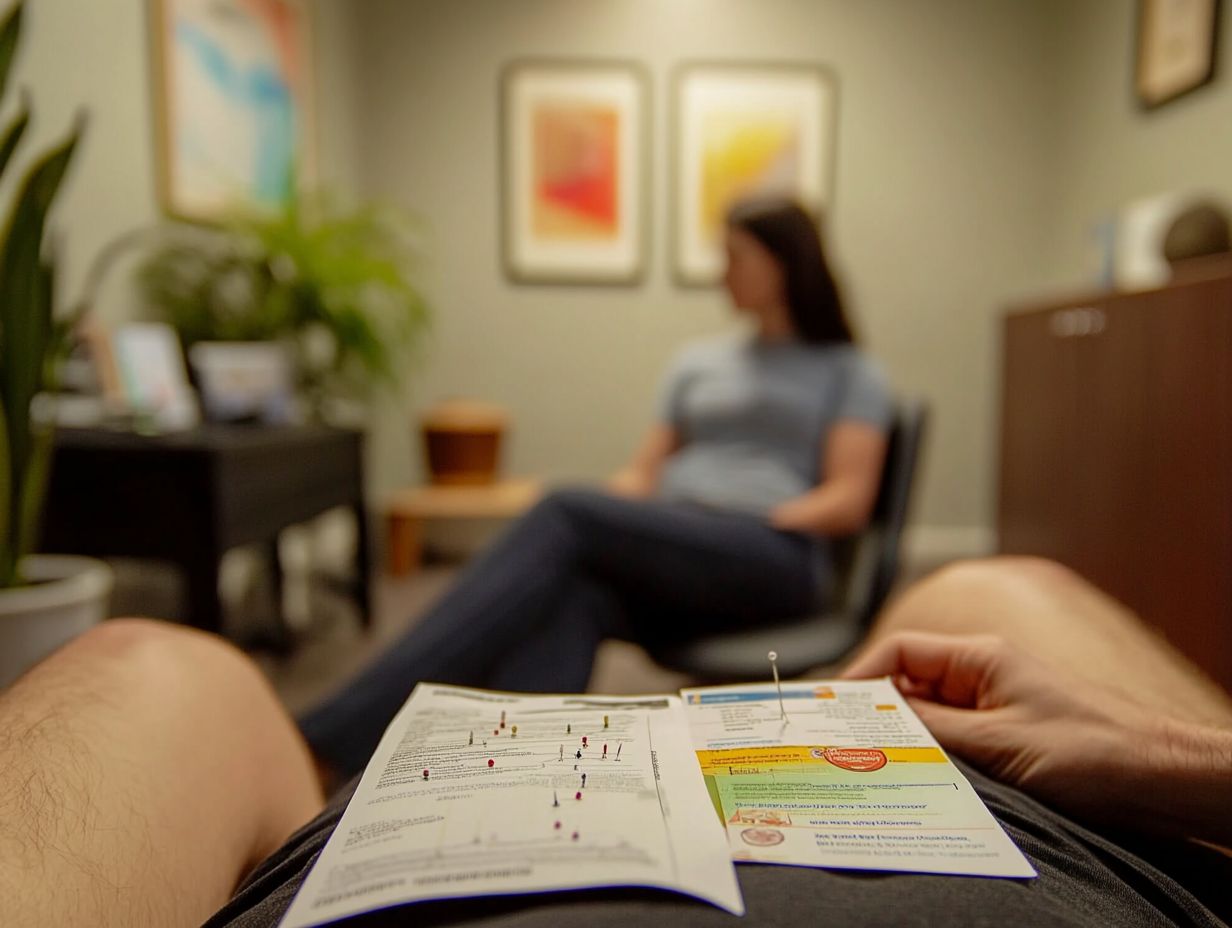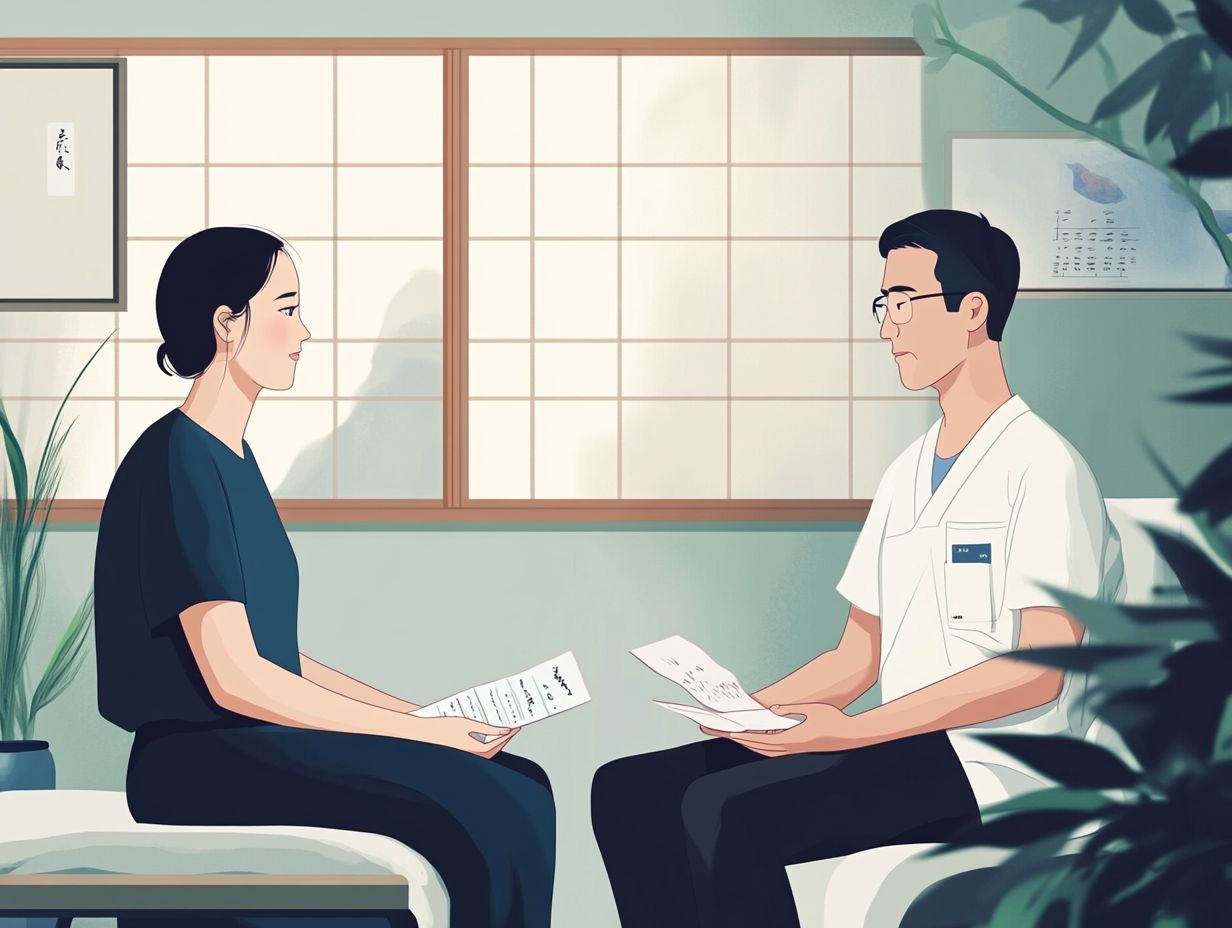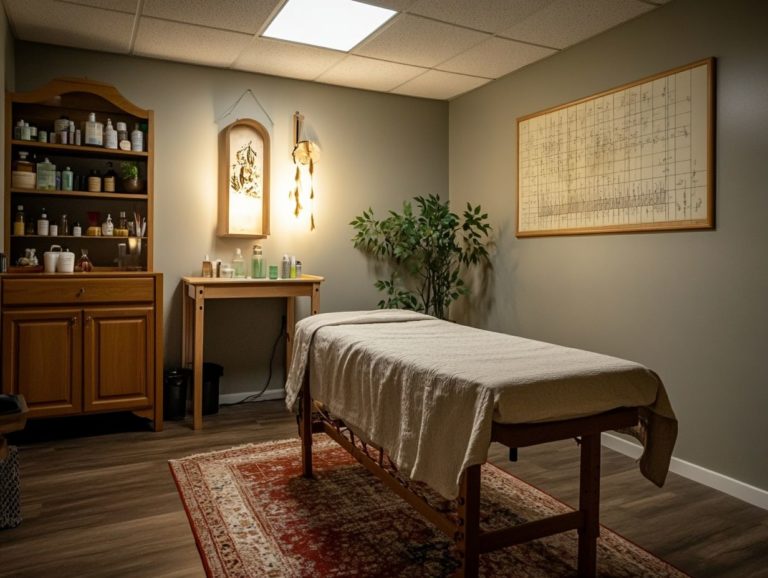5 Key Questions to Ask Your Acupuncturist
Ready to explore the healing world of acupuncture? Here s what you need to know!
Acupuncture can truly be a transformative experience, but it’s vital for you to understand what to expect before stepping into your first session.
If you’re curious about the qualifications of your acupuncturist, the conditions they usually treat, or the potential benefits and risks involved, asking the right questions will make all the difference in your journey.
This article covers five key questions designed to guide you, helping you feel informed and confident as you explore acupuncture. From preparation tips to understanding costs, this guide ensures you have everything you need.
Contents
- Key Takeaways:
- 1. What is Your Training and Experience in Acupuncture?
- 2. What Conditions Do You Typically Treat with Acupuncture?
- 3. How Many Sessions Will I Need and How Often?
- 4. What Are the Potential Benefits and Risks of Acupuncture?
- 5. How Much Does Acupuncture Cost and Do You Accept Insurance?
- What Can I Expect During an Acupuncture Session?
- Frequently Asked Questions
- How Can I Find a Reputable Acupuncturist?
- What Are Some Common Misconceptions About Acupuncture?
- Can Acupuncture Be Used in Conjunction with Other Treatments?
- What Are Some Tips for Maximizing the Benefits of Acupuncture?
- 1. What training and experience do you have as an acupuncturist?
- 2. How do you determine the best treatment plan for each individual?
- 3. What type of acupuncture techniques do you use?
- 4. Are there any potential risks or side effects of acupuncture?
- 5. How many sessions will I need and how often should I come for treatments?
- 6. Can I continue my current medical treatments while receiving acupuncture?
Key Takeaways:
- Ask about the acupuncturist’s training and experience to ensure quality and expertise.
- Inquire about the conditions commonly treated to see if they align with your needs.
- Discuss the frequency and duration of sessions to understand the commitment and potential results.

1. What is Your Training and Experience in Acupuncture?
The training and experience of an acupuncturist are absolutely vital for ensuring you receive safe and effective treatment. This practice intricately weaves together insights from Traditional Chinese Medicine, Taoist philosophy, and practical skills honed through rigorous education in ancient texts like the Huang Di Nei Jing Su Wen.
To become a skilled acupuncturist, you ll embark on a comprehensive educational journey. This often involves formal training at accredited institutions that offer master s degrees or diploma programs in acupuncture. Ensuring that your program is accredited guarantees that you meet the necessary skills and safety standards.
You ll dive into hands-on training that offers invaluable experience in diagnosing and treating various health conditions. This structured training not only equips you with technical skills but also emphasizes essential safety and hygiene protocols, enabling you to create a sterile environment that fosters patient trust and supports effective healing.
2. What Conditions Do You Typically Treat with Acupuncture?
Acupuncture stands as a remarkably versatile treatment that you can turn to for various conditions, from pain management and nausea to anxiety and different aspects of mental health. This makes it an exceptionally effective complementary therapy within Chinese medicine.
Acupuncture also helps with digestive disorders, migraines, and sleep issues.
This ancient practice is grounded in the belief that vital energy flows through specific pathways known as meridians. When the flow of vital energy is disrupted, various ailments can arise.
By having thin needles strategically inserted at specific points along these meridians, acupuncturists aim to restore balance and activate your body s innate healing abilities. This approach alleviates physical discomfort and addresses emotional blockages, promoting overall well-being and enhancing mental clarity.
3. How Many Sessions Will I Need and How Often?
The number of acupuncture sessions you ll need and how often you should attend them will largely depend on your individual conditions, treatment goals, and your acupuncturist s professional judgment. Many patients enjoy benefits after just a few sessions, while others might find themselves on a longer path requiring ongoing treatment.
For instance, if you re dealing with chronic pain, you might benefit from more frequent sessions at the outset often recommended at once or twice a week to effectively manage your symptoms. Conversely, if anxiety is your challenge, you may discover that sessions spaced out every couple of weeks provide ample support as you learn to navigate your experiences.
Acupuncturists place a high value on customizing treatment plans, regularly adjusting the frequency based on your responses and feedback. This ensures your care is perfectly aligned with your unique healing journey.
4. What Are the Potential Benefits and Risks of Acupuncture?

Discover the amazing benefits of acupuncture! It offers pain relief, reduced anxiety, and enhanced mental well-being. However, it’s crucial to discuss potential risks and side effects with a qualified practitioner to ensure safe and effective treatment.
While many find that acupuncture greatly improves their well-being, some may experience bruising, soreness, or even fainting after a session. Misunderstandings about acupuncture are common, such as the belief that it only relies on the placebo effect.
Research shows that acupuncture is effective for many conditions. To enjoy its benefits, prioritize finding a licensed professional who follows strict hygiene protocols and has the necessary training. This ensures your treatment is effective and minimizes health risks.
5. How Much Does Acupuncture Cost and Do You Accept Insurance?
The cost of acupuncture treatment varies based on key factors like your location, the practitioner’s experience, and your insurance coverage.
Many insurance plans, such as Aetna, offer some reimbursement for acupuncture services, reducing your out-of-pocket expenses.
The length of each session also impacts pricing; longer treatments usually cost more.
If you choose a practitioner with advanced certifications or specialized training, their fees may reflect their expertise and quality of care.
Your geographic location matters too; urban areas generally have higher rates than rural settings.
It’s important to check your insurance plan, as coverage for acupuncture can vary widely, including which specific treatments might be eligible for reimbursement.
By understanding these factors, you can make informed decisions and receive the best care within your budget. Contact your insurance provider today to learn more about your coverage for acupuncture!
What Can I Expect During an Acupuncture Session?
During an acupuncture session, expect a serene atmosphere where a skilled practitioner uses sterile needles to stimulate specific areas on your body. To ensure a positive experience, consider these tips for a successful acupuncture experience. This process aims to restore health and balance, rooted in Traditional Chinese Medicine, while adhering to strict hygiene standards.
The session begins with an initial consultation where your practitioner will explore your health concerns, medical history, and wellness goals, ensuring a personalized approach. Following this, you’ll undergo a physical examination, assessing your pulse and tongue both essential indicators of your well-being.
Once a treatment plan is crafted, you’ll comfortably position yourself, allowing the practitioner to focus on targeted areas. As the needles are gently inserted, enhance your experience with relaxation techniques, such as deep breathing or soothing ambient music.
The importance of hygiene cannot be overstated; practitioners should always use pre-sterilized needles and follow strict sanitation protocols. To prepare for your session, wear loose-fitting clothing, avoid heavy meals, and arrive well-hydrated, creating an ideal environment for healing.
What Should I Do to Prepare for an Acupuncture Session?
Preparing for your acupuncture session involves a few essential steps to maximize your experience.
Start by choosing comfortable, loose-fitting clothing that allows easy access to acupuncture points consider athletic wear or soft cotton garments. Staying hydrated in the days leading up to your session can enhance your body’s response to treatment.
Be mindful of your diet; avoiding heavy meals right before your appointment can lead to a more pleasant experience.
It’s vital to be open and honest about any current medications or existing health conditions. This transparency helps your practitioner customize the session to meet your specific needs, maximizing the benefits of therapy.
Consider acupuncture for your health needs; it may be just what you need for improved well-being!
Frequently Asked Questions

How Can I Find a Reputable Acupuncturist?

Finding a reputable acupuncturist requires a thoughtful approach. Start by researching their qualifications, experience, and commitment to professional standards in Chinese medicine. It s also wise to seek recommendations from trusted sources who can guide you.
Next, verify the practitioner’s credentials by checking their education and certifications with local acupuncture associations. Reading online reviews can provide valuable insights into the experiences of others, highlighting the strengths and weaknesses of various practitioners.
Feeling comfortable during your sessions is key to your healing! A trusting relationship with your acupuncturist can significantly enhance the effectiveness of your treatment.
Don t miss the chance to schedule a preliminary consultation it s an important step toward your healing! This allows you to gauge the practitioner’s communication style and empathy, ensuring a supportive atmosphere for your journey.
What Are Some Common Misconceptions About Acupuncture?
You might hold some misconceptions about acupuncture, such as thinking it s painful or lacking scientific credibility. These misunderstandings could keep you from experiencing the remarkable benefits of this ancient practice rooted in Chinese medicine.
Concerns about thick needles causing discomfort are common, but in reality, they are incredibly fine often compared to a human hair resulting in only minimal sensation during treatment.
Numerous scientific studies confirm acupuncture’s effectiveness, especially in pain management, stress reduction, and overall well-being. Research published in reputable medical journals shows that acupuncture can enhance recovery from surgery and alleviate chronic pain, making it a valuable option for those seeking holistic solutions approaches that focus on the whole person mind, body, and spirit.
Can Acupuncture Be Used in Conjunction with Other Treatments?
Acupuncture serves as a powerful ally in your journey toward enhanced health and well-being. It integrates seamlessly with various treatments, including Western medicine, to form a comprehensive plan.
Recent studies highlight how this ancient practice complements modalities such as physical therapy and pharmaceutical interventions, enabling you to find relief from chronic pain or anxiety more effectively.
For instance, in a case study involving patients with knee osteoarthritis, those who added acupuncture to their physical therapy reported improved mobility and significantly reduced pain levels.
Testimonials show that individuals using acupuncture alongside medication for chronic migraine management experience a notable decrease in both headache frequency and intensity, illustrating a synergistic relationship that fosters superior patient outcomes.
What Are Some Tips for Maximizing the Benefits of Acupuncture?
To truly harness the benefits of acupuncture treatment, prioritize open communication with your practitioner, stick to recommended session schedules, and complement your treatments with a balanced lifestyle.
Integrating mindful practices like meditation or yoga can significantly enhance your mental clarity and emotional balance two essentials for overall wellness. Staying hydrated and enjoying a nutrient-rich diet filled with vibrant vegetables, whole grains, and lean proteins will support your healing journey, enabling your body to respond more effectively to acupuncture.
Establishing a self-care routine that emphasizes adequate sleep and effective stress management techniques is invaluable. By recognizing the importance of follow-up sessions, you ensure that the newfound equilibrium is preserved, leaving a lasting impact on your health and vitality.
1. What training and experience do you have as an acupuncturist?
I am a licensed acupuncturist with over three years of graduate education in acupuncture and Chinese medicine. My training includes extensive clinical experience and challenging tests to ensure I provide the best care.
2. How do you determine the best treatment plan for each individual?
Before starting treatment, I assess your health history and current symptoms. This helps me create a personalized plan tailored to your needs.
3. What type of acupuncture techniques do you use?
I use traditional Chinese acupuncture along with modern methods like electro-acupuncture, which employs small electric currents. Together, we will find the best approach for you.
4. Are there any potential risks or side effects of acupuncture?
Acupuncture is a safe procedure when performed by a licensed practitioner. You might feel mild bruising or soreness at the needle sites, but these effects are temporary and will go away quickly.
5. How many sessions will I need and how often should I come for treatments?
The number of sessions depends on your condition and how you respond. Generally, I recommend 6-12 treatments for the best results.
6. Can I continue my current medical treatments while receiving acupuncture?
Yes, acupuncture can complement your existing medical treatments. Please inform me of any medications or therapies you are currently using so we can create the most effective treatment plan for you.






